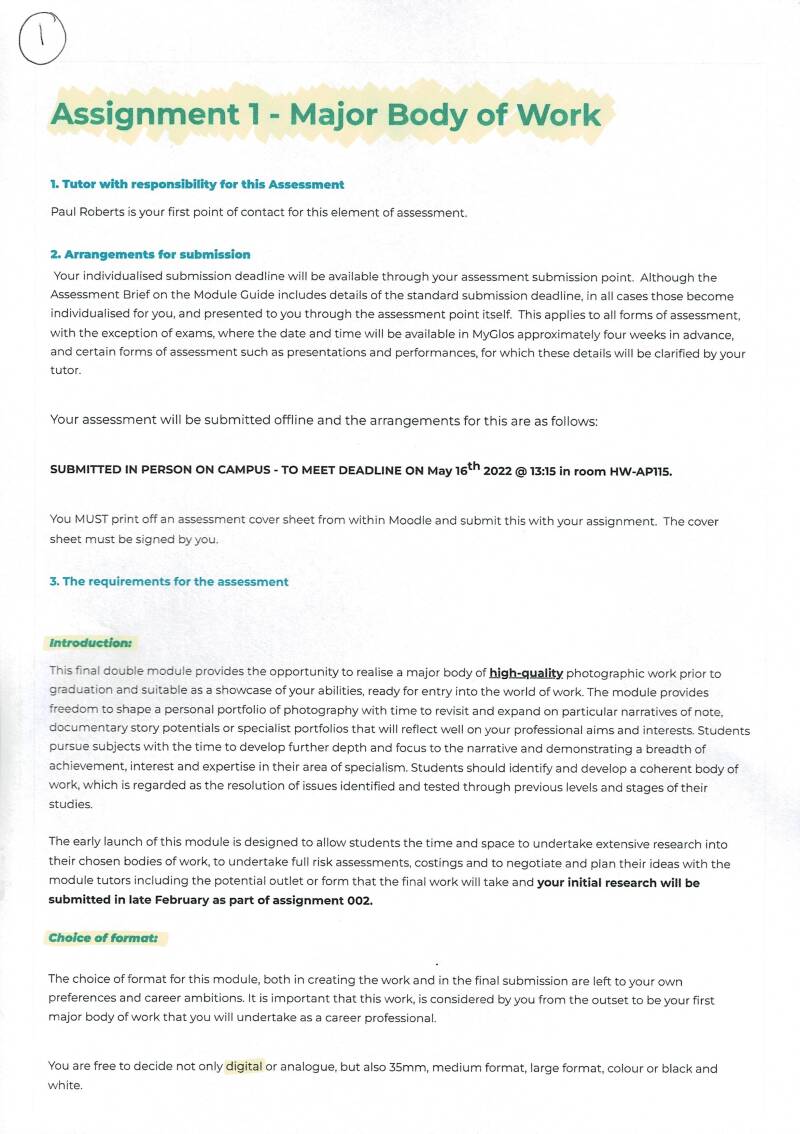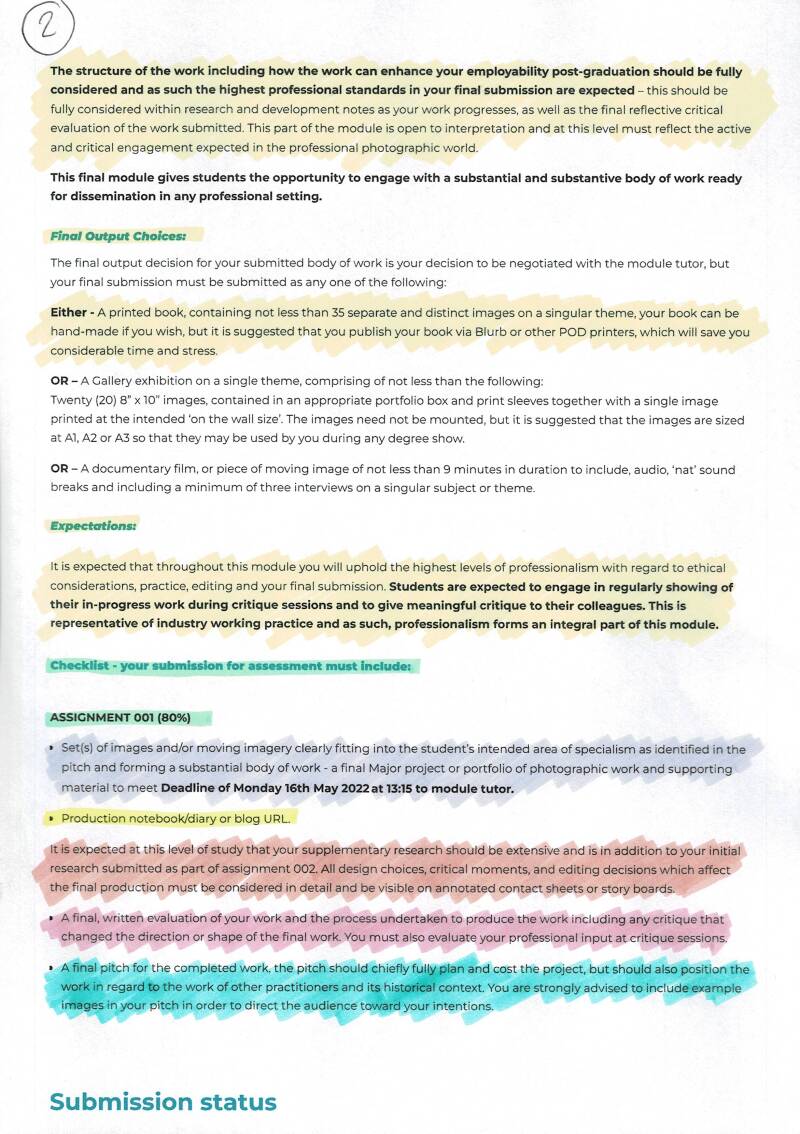Final Major Project
001 - Major Body of Work
Introduction:
This final double module provides the opportunity to realise a major body of high-quality photographic work prior to graduation and suitable as a showcase of your abilities, ready for entry into the world of work. The module provides freedom to shape a personal portfolio of photography with time to revisit and expand on particular narratives of note, documentary story potentials or specialist portfolios that will reflect well on your professional aims and interests. Students pursue subjects with the time to develop further depth and focus to the narrative and demonstrating a breadth of achievement, interest and expertise in their area of specialism. Students should identify and develop a coherent body of work, which is regarded as the resolution of issues identified and tested through previous levels and stages of their studies.
The early launch of this module is designed to allow students the time and space to undertake extensive research into their chosen bodies of work, to undertake full risk assessments, costings and to negotiate and plan their ideas with the module tutors including the potential outlet or form that the final work will take and your initial research will be submitted in late February as part of assignment 002.
Choice of format:
The choice of format for this module, both in creating the work and in the final submission are left to your own preferences and career ambitions. It is important that this work, is considered by you from the outset to be your first major body of work that you will undertake as a career professional.
You are free to decide not only digital or analogue, but also 35mm, medium format, large format, colour or black and white.
The structure of the work including how the work can enhance your employability post-graduation should be fully considered and as such the highest professional standards in your final submission are expected – this should be fully considered within research and development notes as your work progresses, as well as the final reflective critical evaluation of the work submitted. This part of the module is open to interpretation and at this level must reflect the active and critical engagement expected in the professional photographic world.
This final module gives students the opportunity to engage with a substantial and substantive body of work ready for dissemination in any professional setting.
Final Output Choices:
The final output decision for your submitted body of work is your decision to be negotiated with the module tutor, but your final submission must be submitted as any one of the following:
Either - A printed book, containing not less than 35 separate and distinct images on a singular theme, your book can be hand-made if you wish, but it is suggested that you publish your book via Blurb or other POD printers, which will save you considerable time and stress.
OR – A Gallery exhibition on a single theme, comprising of not less than the following:
Twenty (20) 8” x 10” images, contained in an appropriate portfolio box and print sleeves together with a single image printed at the intended ‘on the wall size’. The images need not be mounted, but it is suggested that the images are sized at A1, A2 or A3 so that they may be used by you during any degree show.
OR – A documentary film, or piece of moving image of not less than 9 minutes in duration to include, audio, ‘nat’ sound breaks and including a minimum of three interviews on a singular subject or theme.
Expectations:
It is expected that throughout this module you will uphold the highest levels of professionalism with regard to ethical considerations, practice, editing and your final submission. Students are expected to engage in regularly showing of their in-progress work during critique sessions and to give meaningful critique to their colleagues. This is representative of industry working practice and as such, professionalism forms an integral part of this module.
002 - Initial Planning and Research Submission
When undertaking any extended period of work or any major photographic project the professional practitioner will additionally undertake extensive research which is intended to both inform and to aid the practitioner to critically evaluate their work and their working practices.
It is particularly important to the modern photographer that much of this research is undertaken prior to the commencement of the main body of practical work is undertaken, and therefore this element of assessment is made up of a number of elements.
On Monday February 14th 2022, you are required to present your proposed major project work to the class, your presentation MUST be given in a Powerpoint Format, and should outline your overall plans and intentions for your major project, within your presentation, you must refer to not less than three practitioners, your plans for format that you intend to shoot the work in, any test shots that you have taken, and any potential issues that may limit or adversely affect the final outcome.
This session is important, as it is feedback in this session that will affect your final pitch to be submitted as part of this assessment.
Following this session, and using feedback from your presentation from lecturers and from your classmates you will write a finalised pitch for your major project to meet this submission. Your pitch should be creatively designed and should cover the main points of your presentation, (Idea, Format, Cost, Issues, Influences), your ‘pitch’ is to be output as a PDF file ready for submission.
You are also required to engage in extensive pre-emptive research ahead of shooting that both informs and plans your work for the Major Project.
You must include all background research into your project and any planning and evidence of costing of your project within your blog or journal in addition to researching and reflectively reviewing the work of not less than eight practitioners who either directly address your subject matter OR are shooting in a similar visual style to that intended for your own work.
For example, if your plan is to shoot your major project on black and white film then you should include in your practitioner research, not only practitioners working with your subject matter, but also practitioners, who, whilst they may be dealing with other subjects or issues, are also shooting in black and white film.
Finally, you must also prepare a Risk Assessment to be submitted as part of this assessment and approved BEFORE any photographic work is undertaken.


Create Your Own Website With Webador